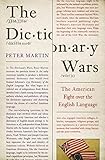The Dictionary Wars : The American Fight over the English Language / Peter Martin.
Material type: TextPublisher: Princeton, NJ : Princeton University Press, [2019]Copyright date: ©2019Description: 1 online resource (376 p.)Content type:
TextPublisher: Princeton, NJ : Princeton University Press, [2019]Copyright date: ©2019Description: 1 online resource (376 p.)Content type: - 9780691188911
- 9780691189994
- 423 23
- PE1611 .M295 2019
- online - DeGruyter
- Issued also in print.
| Item type | Current library | Call number | URL | Status | Notes | Barcode | |
|---|---|---|---|---|---|---|---|
 eBook
eBook
|
Biblioteca "Angelicum" Pont. Univ. S.Tommaso d'Aquino Nuvola online | online - DeGruyter (Browse shelf(Opens below)) | Online access | Not for loan (Accesso limitato) | Accesso per gli utenti autorizzati / Access for authorized users | (dgr)9780691189994 |
Browsing Biblioteca "Angelicum" Pont. Univ. S.Tommaso d'Aquino shelves, Shelving location: Nuvola online Close shelf browser (Hides shelf browser)

|

|

|

|

|

|

|
||
| online - DeGruyter Of Privacy and Power : The Transatlantic Struggle over Freedom and Security / | online - DeGruyter Quaint, Exquisite : Victorian Aesthetics and the Idea of Japan / | online - DeGruyter A Republic of Equals : A Manifesto for a Just Society / | online - DeGruyter The Dictionary Wars : The American Fight over the English Language / | online - DeGruyter Emergency Chronicles : Indira Gandhi and Democracy's Turning Point / | online - DeGruyter Saint Patrick Retold : The Legend and History of Ireland's Patron Saint / | online - DeGruyter Patient Capital : The Challenges and Promises of Long-Term Investing / |
Frontmatter -- Contents -- Preface -- PART ONE: NOAH WEBSTER'S BATTLES -- 1. British Mockery and American Disdain -- 2. Noah Webster -- 3. Webster's First Dictionary -- 4. Displacing Delilah -- 5. The Lexicographer's Fifth Column -- 6. Tea and Copyright -- 7. Spelling Wars -- 8. The "Common Thief " -- 9. Webster's Decline -- PART TWO: THE MERRIAMS AT WAR -- 10. Taking Webster out of Webster -- 11. Waiting for Worcester -- 12. The Bohn Affair -- 13. Converse's Complaint -- 14. Children, Money, and "Trash" -- 15. High Stakes -- 16. The "Terrible Rival" -- 17. The Merriams Triumphant -- Conclusion -- Appendix A: The "Webster" Brand -- Appendix B: Four Centuries of Selected Dictionaries of the English Language -- Appendix C: Publishing Terms -- Appendix D: "The Spelling Bee at Angels (Reported by Truthful James)," by Bret Harte -- Acknowledgments -- Abbreviations -- Notes -- Bibliography -- Index
restricted access online access with authorization star
http://purl.org/coar/access_right/c_16ec
A compelling history of the national conflicts that resulted from efforts to produce the first definitive American dictionary of English In The Dictionary Wars, Peter Martin recounts the patriotic fervor in the early American republic to produce a definitive national dictionary that would rival Samuel Johnson's 1755 Dictionary of the English Language. But what began as a cultural war of independence from Britain devolved into a battle among lexicographers, authors, scholars, and publishers, all vying for dictionary supremacy and shattering forever the dream of a unified American language.The overwhelming questions in the dictionary wars involved which and whose English was truly American and whether a dictionary of English should attempt to be American at all, independent from Britain. Martin tells the human story of the intense rivalry between America's first lexicographers, Noah Webster and Joseph Emerson Worcester, who fought over who could best represent the soul and identity of American culture. Webster believed an American dictionary, like the American language, ought to be informed by the nation's republican principles, but Worcester thought that such language reforms were reckless and went too far. Their conflict continued beyond Webster's death, when the ambitious Merriam brothers acquired publishing rights to Webster's American Dictionary and launched their own language wars. From the beginning of the nineteenth century to the end of the Civil War, the dictionary wars also engaged America's colleges, libraries, newspapers, religious groups, and state legislatures at a pivotal historical moment that coincided with rising literacy and the print revolution.Delving into the personal stories and national debates that arose from the conflicts surrounding America's first dictionaries, The Dictionary Wars examines the linguistic struggles that underpinned the founding and growth of a nation.
Issued also in print.
Mode of access: Internet via World Wide Web.
In English.
Description based on online resource; title from PDF title page (publisher's Web site, viewed 21. Jun 2021)


